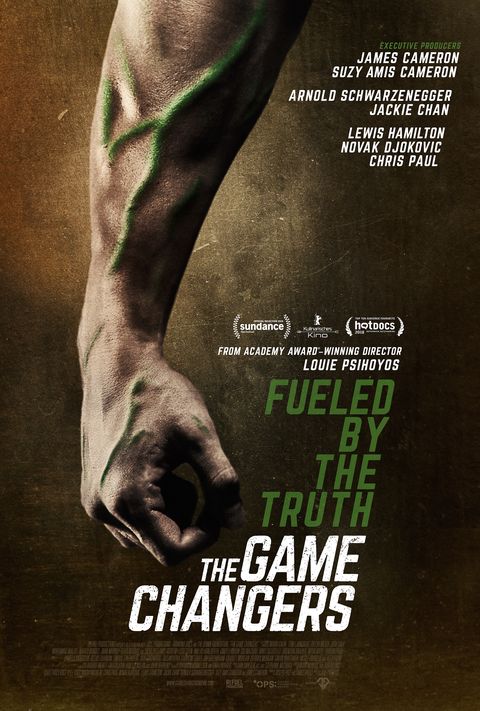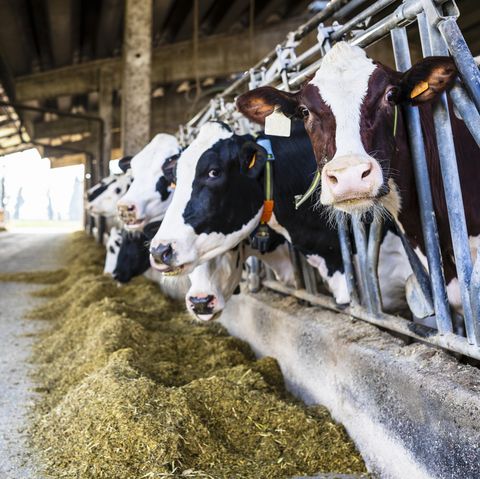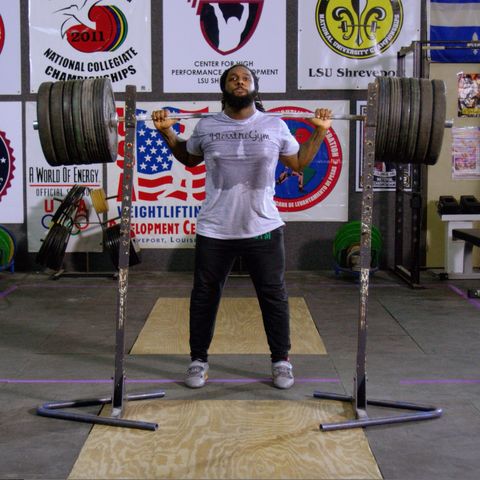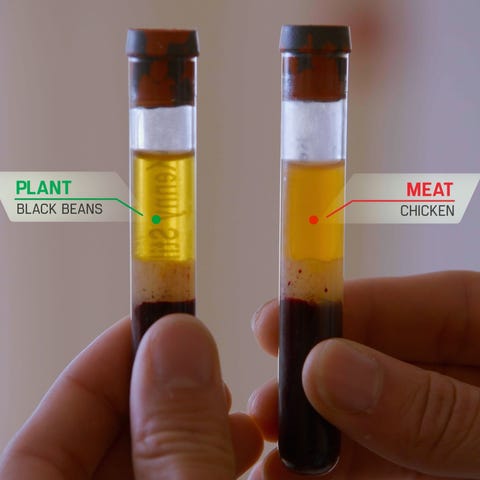This New Documentary Says Meat Will Kill You. Here's Why It's Wrong.
If you were to say the words “plant-based” to someone 15 years ago, they might have stared at you, head tilted slightly, and said, “Huh?”
That’s because 15 years ago the term didn’t really exist. Neither did Forks Over Knives, or Impossible Burgers, or fake chicken at KFC.
Now everyone from Mike Tyson to your mother-in-law is eating plant-based, and reporting that they’ve lost weight, dropped their cholesterol levels, and increased the amount of pep in their step at least threefold.
And a new documentary called The Game Changers is pushing the “plant-based” lifestyle even further. The film, produced by James Cameron, argues that eating any animal products—including meat, fish, eggs, and dairy—can hinder athletic performance, wreak havoc on your heart, impair sexual function, and lead to an early death.
In the film, James Wilks, a former MMA fighter, narrates his personal journey of switching from a diet that included animal products to one that doesn’t.

The Game Changers
Throughout the film, Wilks cites scientific research, interviews numerous medical doctors, and features a number of vegan and vegetarian athletes (although those words, “vegan” and “vegetarian” are rarely uttered).
“Veganism and vegetarian are stigmatized,” Wilks said, in an interview with Men’s Health. “We’re not trying to tell people to go vegan. We are presenting the facts and letting people make their own decisions.”

Westend61
Except that The Game Changers presents only one side of the facts, often via controversial sources, grand extrapolations from small studies, and statements that are flat-out misleading.
Here’s are three things The Game Changers gets wrong and one thing it gets right.
Wrong: The Research on the Benefits of Non-Meat Diets Is Vast and Well-Established.
Wilks begins the movie, and builds its entire concept around, a study he came across that reported Roman gladiators didn’t eat meat.
Except that the study isn’t actually a study.
It’s a short narrative by Andrew Curry, a contributing writer to Archaeology, a publication of the Archaeological Institute of America.

Spanic
Curry recounts a visit to the Medical University of Vienna where he held a gladiator skull and remarks upon how gladiators ate “a vegetarian diet rich in carbohydrates, with the occasional calcium supplement.”
There does exist research on gladiators following non-meat diets, some of which is later cited in the film, but Wilks still calls a narrative a “study” when it is not a study.*
Yes, this is a minor point, but it’s indicative of the often misleading portrayal of “research” to come.
And The Game Changers is filled with research. Studies flash upon the screen at a wild rate—sometimes three or four in a row. Medical experts offer long explanations of scientific conclusions in lab-coat speak. The amount of data is daunting, with the implication being: Look at all the science! How can veganism be wrong?!
The problem is that the study findings are often twisted and presented to the viewer without giving them a full understanding of the research.
In one instance where Wilks does cite actual peer-reviewed research, he narrates: “And when it comes to gaining strength and muscle mass, research comparing plant and animal protein has shown that as long as the proper amount of aminos acids are consumed the source is irrelevant.”
What Wilks doesn’t call out is that the same study states this: “as a group, vegetarians have lower mean muscle creatine concentrations than do omnivores, and this may affect supramaximal exercise performance.”
Elsewhere in The Game Changers, Wilks name-checks studies that feature small sample sizes and then extrapolates broad generalizations.

deimagine
The most glaring instance of this is when Wilks claims that cow’s milk can increase estrogen and lower testosterone in men.
The 2010 study he references, published in the journal Pediatrics International, was conducted using the milk of pregnant cows. The scientists pulled from a pool of 18 people (seven men, six children, and five women), and found that milk reduced testosterone secretions—not overall testosterone—temporarily.
Seven men. Temporarily.
Wilks later argues that the Big Meat Industry floods scientific journals with funded research, which buries the good news of vegan (excuse me, plant-based) diets and further confuses consumers.
This is a fair point—the meat industry does fund scientific research—except that Wilks goes on to cattle-prod himself in the forehead.
One of the studies The Game Changers cites repeatedly throughout the film is “Hass Avocado Modulates Postprandial Vascular Reactivity and Postprandial Inflammatory Responses To a Hamburger Meal In Healthy Volunteers.”
Wilks uses this study to support his argument that meat impairs blood flow and increases inflammation. Except, that as you can probably guess, the study is “supported by the Hass Avocado Board.”
If there’s one piece of produce that The Game Changers is especially rich in, it’s cherries, as in those picked for evidence.

Guido Mieth
Wrong: There Are a Host of Deadly Toxins, Inherent to All Animal Products, That Are Highly Dangerous. Like as Dangerous as Cigarettes.
Numerous times throughout the documentary, The Game Changers bombards you with the scientific terms TMAO, hetereocyclic amines, heme iron, neu5gc (a doozy!), endotoxins, and AGEs.
Here, again, Wilks presents claims that these compounds, unique to animal products, increase the risk of inflammation, which can lead to a host of nasty diseases, particularly cancer.
Except that the scientific understanding of these compounds is far less studied than The Game Changers leads the viewer to believe. And the results of emerging studies are not nearly as concrete as those done on cigarettes, as the film later implies.
Let’s take the relationship between processed meats and colorectal cancer as one example.

Sami Sert
“A person’s lifetime absolute risk of developing colorectal cancer is about 5 percent. We also know that eating processed meats increases the risk of developing colorectal cancer,” says Brian St. Pierre., M.S., R.D., C.S.C.S., Director of Performance Nutrition at Precision Nutrition, a nutrition coaching company that has worked with the San Antonio Spurs, the Carolina Panthers, and thousands of non-athlete clients.
“In fact, eating 50 grams of processed meat daily (about one hot dog) increases the risk of developing colorectal cancer by 17 percent. Sounds scary. However, this increased risk is relative,” St. Pierre says.
In reality, actual risk goes up by about 1 percent total, to a new absolute risk of about 6 percent.
Sure, any increase in a risk of cancer isn’t good. But it’s not as bad as disinformation efforts can make it seem.
“These kind of misunderstandings (or intentional misleadings) make it easy for folks to be confused, or to misinterpret or misunderstand actual changes to risk,” St. Pierre says. “It’s not wrong, it’s just often out of context.”
“So, while it’s true that the ‘strength of the evidence’ for the carcinogenicity of smoking is the same as processed meat. The ‘degree of risk’ is not even in the same sport, let alone the same ballpark,” he says.
“What The Game Changers fails to mention is that though hetereocyclic amines seem to cause cancer, and the overall risk may be small, you can mitigate potential damage by marinating your meat with spices and acidic marinades (such as yogurt or vinegar-based marinades),” St. Pierre says.
“And by eating your meat with fruits and vegetables, all of which can significantly reduce your risk of HCAs.”
You could even go so far as to say “virtually eliminate your risk”, as they can decrease HCA formation by up to 99 percent, says St. Pierre.
Wrong: Diet Is EVERYTHING.
The Game Changers does an incredible job of pulling in high-performing athletes who have made a switch to a plant-based diet and excelled.
Scott Jurek, Morgan Mitchell, Patrik Baboumian, Kendrick Farris, Arnold freakin’ Schwarzenegger—they’re all in the film, their power and prowess on full display.

The Game Changers
But here’s the thing: Each one of their stories is an anecdote—nothing more.
For all the vegan undertones to The Game Changers, the documentary sure features a lot of man meat—boxers beating up tires, powerlifters flipping cars, linebackers blasting through drills. The implication is look what plants built.
It’s impressive, but diet is only a small piece of overall health.
In the film, Wilks shows two experiments. The first experiment features preventive cardiologist Robert Vogel, M.D., administering a blood test to three athletes after they’ve eaten burritos with animal proteins compared to after they’ve eaten burritos with plant protein. The second experiment features urologist Aaron Spitz, M.D., administering an erectile strength and frequency test to three athletes under the same burrito conditions.

The Game Changers
Both tests (surprise!) come out as beneficial for the plant-based circumstances. But there are so many variables left unconsidered in both of these experiments.
Neither of these “experiments” considers (or at least mentions the possible consideration of) variables like sleep, muscle fatigue, stress, training, hydration, history of tobacco use, weekly alcohol consumption, prior medical history, mental clarity, emotional state, and—HERE’S A BIG ONE—genetic predispositions.
None of the athletes featured talk about these things either. The Game Changers makes athletic performance all about diet. But diet is only one component of a larger concept of what it means to be a healthy person, whether you’re an athlete or not.
Right: Soy Isn’t the Nutritional Demon It Was Once Considered to Be.
Wilks is correct in his presentation of the overblown connections between the phytoestrogens in soy products and their supposed effects on estrogen levels in men.

istetiana
But what about low sperm count and man boobs? Back in the 2000s, a few small studies and rodent research suggested that the phytoestrogens in soy products could disrupt hormones.
“Such a link has never been substantiated in human studies,” says Qi Sun, M.D., assistant professor in the Department of Nutrition at Harvard University. “I don’t think this is a concern at all,” Sun says.
The Bottom Line: Stop Thinking of Diet as Either/Or.
The Game Changers repeatedly pits a vegan diet against a diet that includes meat. The film does this to such an extent that you slowly realize that “plant-based” is just a masquerade for “vegan.”
Either you eat animal products and suffer the consequences or avoid animal products and thrive, the movie argues.
Except that there’s another choice: Eat more vegetables.

gilaxia
This is the choice that has vast and well-established scientific benefits.
This is the choice that qualified and experienced registered dietitians (of which none are featured in The Game Changers, by the way) urge their clients, professional athletes and regular people alike, to adopt.
This is a choice of inclusion, rather than exclusion.
Around the half-hour mark, The Game Changers makes this claim: “Even iceberg lettuce has more antioxidants than salmon or eggs.”
It’s a statement that is so face-smackingly stupid, and it typifies the dangers of either/or eating.
By over-valuing one nutrient (antioxidants in iceberg lettuce), you devalue the host of beneficial nutrients in the other (heart-healthy omega-3 fatty acids in salmon, brain-aiding choline in eggs—just to name two).
“Ultimately, it’s not that getting people to eat plants is a bad thing. It’s generally a great thing. But you don’t have to do so by erroneously telling people that meat is killing them, and they need to go to an all-plant diet. That is a false dichotomy,” says St. Pierre.
“Instead, teach them the benefits of adding more wholesome plant foods to their meat intake. And then teach them to eat higher-quality meat options. Maybe even to consider swapping some meat for a plant-based protein (such as tempeh, tofu, or seitan). There’s a progression, and a happy middle ground for most.”
*Editor’s Note: This section was added after publication to clarify the argument.
The debate continues! James Loomis, M.D., former team physician for the St. Louis Rams and St. Louis Cardinals, who appears in The Game Changers, has written a rebuttal to this piece. We respect Loomis’ opinion, but we stand by our reporting and analysis of the film.
After review, we decided to remove the short section provided by Mike Roussell (you can read the original text below), due to his connections to the beef industry. And we want to reinforce that we absolutely, and in no way, possess any animosity toward vegans. In fact, we love them.
[“I see the problem with plant-based diets as one of false assumptions,” says Mike Rousell, Ph.D., author of The MetaShred Diet. “People go on a plant-based diet, get healthy, and say ‘Oh, it was the chicken and meat that was slowing me down.’ They don’t pay attention to the lack of vegetables they were consuming previously.”]
Source: Read Full Article


